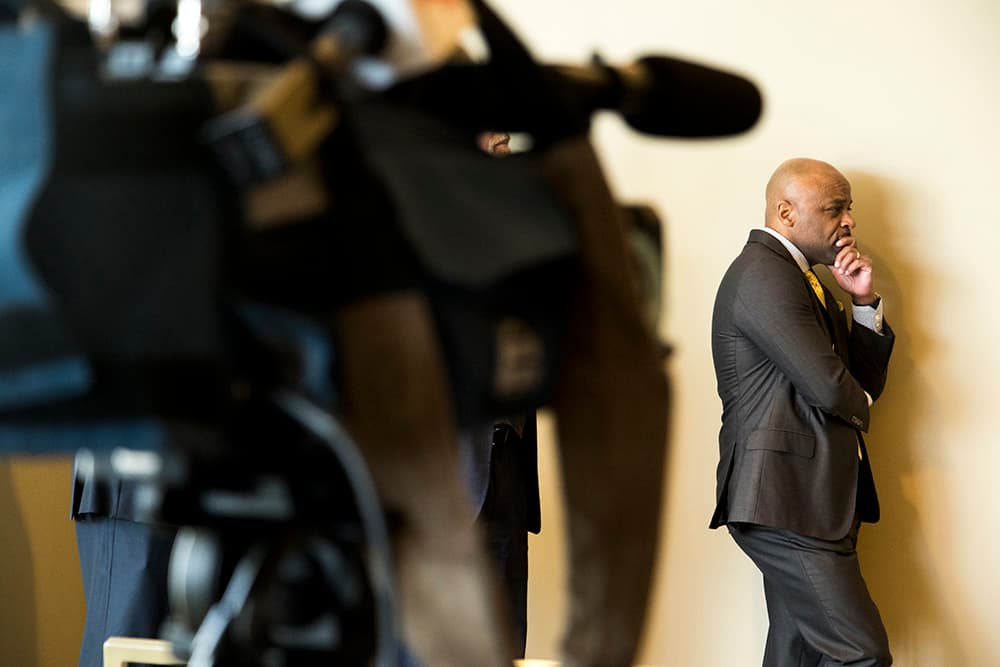For the first time, Denver's elected leaders are preparing to subject themselves to formal policies on sexual harassment.
Cities around the country have struggled with the question of how to handle complaints about mayors and council members. As we reported earlier, it's difficult to fire or discipline people who are elected by voters.
In Denver, that became an issue when Mayor Michael Hancock recently admitted to sending lascivious text messages in 2012 to a police officer, who described them as sexual harassment. As it turned out, the city rules for employees don't include elected officials.
The Denver City Council claimed that it essentially couldn't investigate Hancock, and they promised to work out rules that at least covered their own behavior.
Now we know what they're proposing.
The council members last week discussed a draft "respectful workplace policy." It would cover the council members and their offices. The mayor's office is working on a separate policy that will apply to itself and potentially other members of city government, according to Kirsten Crawford, legislative counsel for the council.
The draft would:
- Create definitions of harassment, sexual harassment and retaliation
- Establish a way for council members to issue statements that formally reprimand other council members
The new draft policy for the council declares that Denver's citizens "expect their elected officials to behave in a manner befitting the honor and privilege they hold as representatives of the city ... Discrimination, harassment, and retaliation in the workplace are against the law and will not be tolerated."
Previously, people could file complaints about this kind of behavior, but there was no formal process for handling them.
"We ... wanted to make it clear that good-faith complaints will be addressed swiftly and promptly, and that the complaints will be managed by (the Office of Human Resources) in consultation with the city attorney's office," Crawford told the council.
The document defines harassment as verbal or physical conduct that targets someone who is a member of a "protected class," such as race or religion. Councilwoman Mary Beth Susman asked whether that definition should be broader.
The draft also includes a definition of sexual harassment, which includes requests for sexual favors as well as unwanted sexual advances. As an example, it includes jokes about sexual conduct, gossip about sex life, catcalling and text messages of a sexual nature.
It also lays out a process for resolving complaints.
The document says who may be contacted -- including supervisors, HR representatives and council members -- and lays out expectations for privacy. The complaint process would be confidential, but the city would report the number of complaints, the outcomes and some basic details each year.
Actually punishing elected officials is a little tricky. It isn't possible to expel elected officials from Denver's government. Instead, the council members could vote to censure each other -- basically, to formally declare that they behaved badly.
"I think that in a situation where people can't be fired ... it is appropriate that there's a mechanism for accountability," said Councilwoman At-large Robin Kniech.
There was some debate about how many votes it should take to censure a council member -- nine out of 13? ten? -- but council members seemed to like the idea.
What about the mayor?
Meanwhile, the city attorney's office is working with the mayor's office, the clerk and the auditor on similar policies. Councilwoman At-large Debbie Ortega said that those policies need to be similar, "as opposed to them being all over the map."
However, Councilman Kevin Flynn suggested that the council could cover all of the elected officials with its own rules -- "in other words, not just us" -- and that the policy should be embedded in the code of ordinances, "so that everybody knows what to expect."
Kniech disagreed. She said that she also wanted "uniform accountability," but she worried that a citywide system might not have the right nuance. "This policy is intended to give very specific instructions to complaining parties," she said. And a "big system may discourage people," she said, suggesting that some people may simply want the council president to talk to an individual, rather than keying off a larger investigation.
Councilman Paul López said he wanted a "cross-agency, cross-branch policy." Councilman Rafael Espinoza suggested that a new law could require each elected office to develop a policy that hits the same points, allowing some nuance between them.
The administration's goals and timing will be similar to the council's, according to spokesperson Amber Miller.
What's next?
The new policies are still in their draft stages. The council could vote to create an ordinance, or it could take the easier and less permanent method of simply adopting a policy. The proposal will likely go through some revisions before that happens.
Meanwhile, the mayor's office could establish its own policy in the near future.













